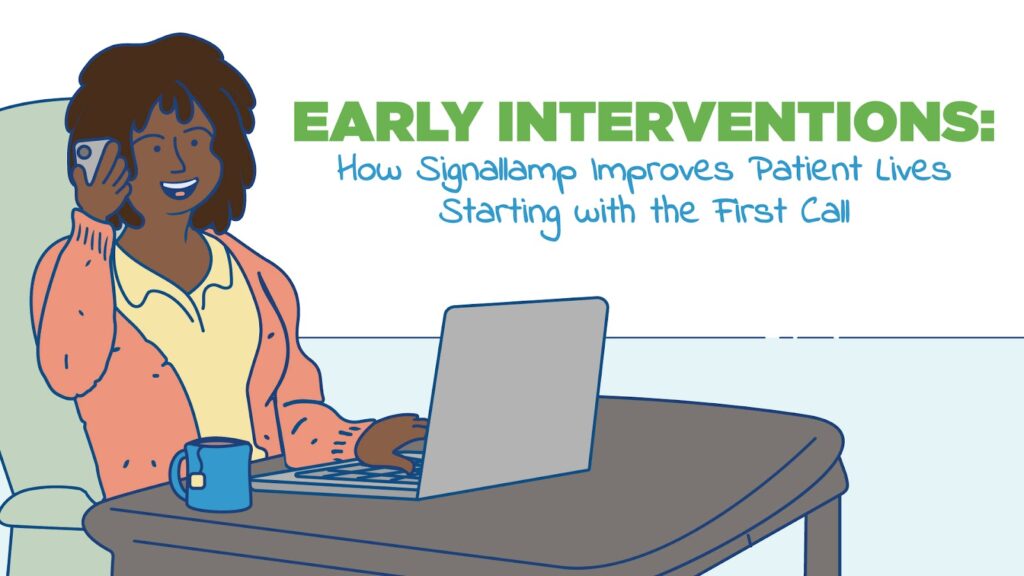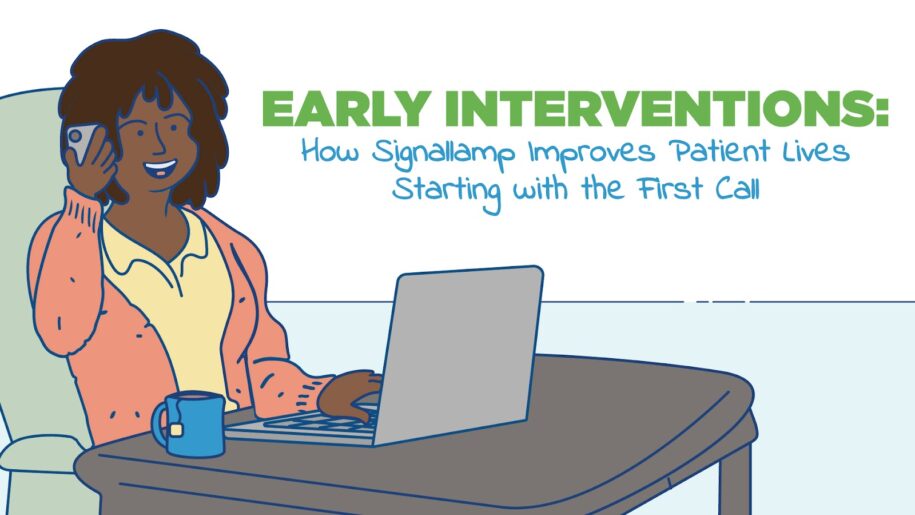
Early Interventions: How Signallamp Improves Patient Lives Starting with the First Call
Question: How quickly can an effective chronic care management program start improving outcomes?
Answer: In many cases, they start on the first day.
So much of the Signallamp model for chronic care management relies on building relationships. These relationships take root over time and help patients to flourish through accountability and routine.
But improved outcomes can also start at the introduction.
Such was the case for Joe, a patient with chronic disease who was taking multiple prescriptions to manage symptoms.
A quick note: when retelling these stories, we’ve changed the names of the people involved to protect their privacy, but the facts are all true.
Kelcie, Joe’s Signallamp remote nurse case manager, called to introduce herself and get him started on the care management program. As a standard part of the initial call, Joe and Kelcie completed a medication reconciliation.
The medication reconciliation process allows the nurse to understand exactly what medications the patient is taking, and if the patient is being compliant with the medication orders from their provider. In some cases, the nurse finds medication discrepancies.
This was the case for Joe, and, as we’ll see with what happens next, it can reveal profound new information.
When Kelcie asked Joe about bumetanide, a potent prescription to help reduce water retention, he became agitated. He couldn’t find his pill bottle. Then he realized that he hadn’t filled his prescription in several months. He got even more frustrated.
With this new information, Kelcie asked Joe questions about water retention. During her assessment, Kelcie learned that Joe’s lower extremities were swollen and had been that way for a few weeks — a blaring warning sign that his medication noncompliance, intentional or not, had gotten out of hand.
Kelcie also discovered during her assessment possible signs of cellulitis. Kelcie immediately followed up with Joe’s primary care doctor with her findings, noted the bumetanide discrepancy, and made an office appointment for Joe for the next morning.
During a follow-up appointment, Joe’s provider diagnosed him with cellulitis, refilled his bumetanide, and added an antibiotic to his treatment plan.

Intervention through patient education
Not all patients show the same kind of urgency and frustration when they need an intervention.
Harold was taking lisinopril for high blood pressure, which occasionally triggers a cough at first or after a dosage increase. Harold’s provider thought that perhaps the medicine was causing his dry cough and had recently dropped his dosage.
After enrolling with Signallamp, remote nurse manager Jodi called Harold to get him started on the care management program. Over the course of their 30-minute call, she learned that Harold’s cough persisted despite the dosage change, which suggested Harold was experiencing an acute change in his status.
While assessing her patient’s status and reviewing his provider’s EMR and orders, Jodi came across an open order for a pulmonary function test. When Jodi asked Harold about the open PFT order, she learned that Harold had refused the test because he did not feel it was relevant to his care. He explained that he didn’t know what the test was for.
Jodi knew that she had to explain the importance of the test and how it correlates with his health conditions. After Harold understood the importance of the test, he asked Jodi to help him schedule one. Jodi was more than happy to assist and got Harold in that week for the PFT.
Jodi updated his care plan to include additional follow-up calls and an appointment with his provider to discuss increasing the lisinopril.
When there’s no time for patient engagement
In some cases, early phone calls can be profoundly valuable not just for patients, but for their caregivers and families.
Francine, an elderly patient who just left a rehabilitation facility following treatment for a shoulder fracture from a fall, moved into a nursing home for further rehab. Just two hours after checking in, she fell again.
So distraught, Francine’s daughter checked her out immediately and brought her home. They came up with a plan to provide her with round-the-clock care — without home health help. Fortunately, they had just enrolled mom into the care management program her primary care provider offers. Francine’s daughter knew that Hannah, the care management nurse assigned to her mom, can assist her during office hours as needed.
We love to see this kind of compassion from loved ones, and we’re always honored to partner with the family care team to help patients achieve the best outcomes.
After getting her settled at home, Francine’s daughter called Hannah the next morning concerned about her mom’s condition. Francine was experiencing pain since she had fallen at the nursing home, and this had her daughter very concerned.
Francine’s story offers a clear example of how some cases leave no room to build relationships at first. The next steps were obvious.
Hannah was able to schedule an acute office visit with Francine’s provider that morning. Subsequent tests found an additional fracture to her injured shoulder.
After getting set up with physical and occupational therapy, Francine is back at home with her family and on a clear path toward recovery.
Schedule a call to see how Signallamp Health can immediately improve the lives of patients in your practice or health system.

